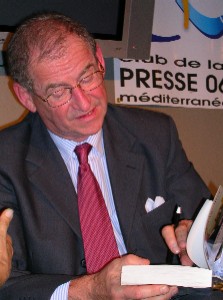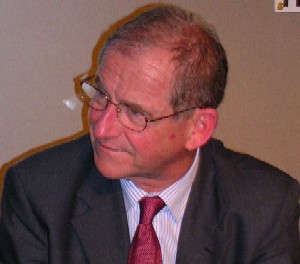
According to the organizer, the FNAC forum had never welcomed so many people. It’s no wonder when you consider the personality of Eric de Montgolfier. The magistrate leaves no one indifferent. Made famous for bringing down Bernard Tapie at his peak, the Public Prosecutor “fears no one.” Serving in Nice since 1999, and despite being sixty years old, he hasn’t lost any of the Valenciennes vigor that built his renown. After taking his seat amid thunderous applause, the man responded to questions from two journalists, Pascal Gaymard (Le Petit Niçois) and Dominique Antoni (France Bleu Azur).
Cold, clear-headed to some, calm to others, he detailed his thoughts. “I tried in this book to explain to citizens the functioning of justice. And not the one seen in the press.” He continued in the same tone: “The press has an obligation to inform, but journalists lack competence in the judicial domain to convey the info.” Rest assured, the fourth estate is not the only one criticized. “Citizens demand too much from the justice system. My role is to intervene only when the criminal law is breached. I’m not here to ensure people’s protection.”
The Johnny Halliday case divides the public
His diatribes did not leave the audience unmoved. As protests grew more vocal, the Johnny Halliday topic was brought up. In a poorly contained brouhaha, reproaches blossomed. The icon was touched, and the topic was divisive. In a remake of the Dreyfus Affair, the room split between Johnny supporters and detractors. But once again, the magistrate regained control. With disconcerting skill, the writer united everyone: “Firstly, I did not see Johnny Halliday in front of me, but Jean-Philippe Smet. Citizens are equal before the law. And in this case, a dismissal was pronounced due to insufficient charges. I do not regret this decision, but I regret when it is challenged. We must accept justice, even when it’s unsettling.”
A salvo of applause, and the audience was won over. However, the life of a magistrate in the midst of a literary promotion is not restful. Barely is one contentious issue settled before another arises. The eagerly awaited question comes. Is Judge Burgaud responsible for the Outreau disaster? The Prosecutor’s response is anticipated. He feels the pressure and requests some clarification. Every word counts. The tension peaks. “Unfortunately, justice is fallible. Judicial error is inherent to human nature. Maybe he was wrong to be sensitive to the victims.” The debate on justice reform can finally commence. To minimize errors, his method is simple: “When a victim appears before me, I cannot feel compassion.”  I am not here to cry with her, but to uphold the law and be impartial.” But to achieve this way of acting, insensitive, almost dehumanized, one must have experience. With his thirty years of experience, he puts forth a hypothesis: “Even if maturity does not necessarily align with age, I believe experience brings maturity. It is dangerous to let young inexperienced people become investigating judges. I believe someone fresh out of school should prove themselves for ten years as a lawyer or at the Prosecutor’s Office before becoming a judge.”
I am not here to cry with her, but to uphold the law and be impartial.” But to achieve this way of acting, insensitive, almost dehumanized, one must have experience. With his thirty years of experience, he puts forth a hypothesis: “Even if maturity does not necessarily align with age, I believe experience brings maturity. It is dangerous to let young inexperienced people become investigating judges. I believe someone fresh out of school should prove themselves for ten years as a lawyer or at the Prosecutor’s Office before becoming a judge.”
This final speech partially rehabilitates Judge Burgaud. For France’s most famous Prosecutor, the Outreau investigating judge “is merely a scapegoat for an obsolete Third Republic system, which has been allowed to thrive.” Thus, the lack of experience, highlighted by Eric de Montgolfier, is not the only flaw in the judicial system. “The role of the judge, who must conduct both incriminating and exonerating investigations, is far too significant for one human.” Would the tragedy have occurred with an experienced judge? The answer will never be known.


